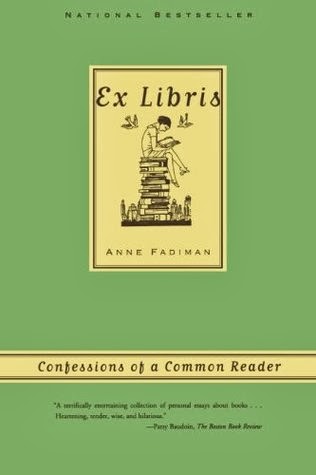Ex Libris: Confessions of a Common Reader
Summary (from the publisher): Anne Fadiman is - by her own admission - the sort of person who learned about sex from her father's copy of Fanny Hill, whose husband buys her 19 pounds of dusty books for her birthday, and who once found herself poring over her roommate's 1974 Toyota Corolla manual because it was the only written material in the apartment that she had not read at least twice.
This witty collection of essays recounts a lifelong love affair with books and language. For Fadiman, as for many passionate readers, the books she loves have become chapters in her own life story. Writing with remarkable grace, she revives the tradition of the well-crafted personal essay, moving easily from anecdotes about Coleridge and Orwell to tales of her own pathologically literary family. As someone who played at blocks with her father's 22-volume set of Trollope ("My Ancestral Castles") and who only really considered herself married when she and her husband had merged collections ("Marrying Libraries"), she is exquisitely well equipped to expand upon the art of inscriptions, the perverse pleasures of compulsive proof-reading, the allure of long words, and the satisfactions of reading out loud. There is even a foray into pure literary gluttony - Charles Lamb liked buttered muffin crumbs between the leaves, and Fadiman knows of more than one reader who literally consumes page corners. Perfectly balanced between humor and erudition,Ex Libris establishes Fadiman as one of our finest contemporary essayists.
Review: Composed of eighteen separate essays that Fadiman wrote over a period of several years, this is an ode to the written word - to the consumption and creation of books from one book lover to others. Born into a family of readers and married to another, Anne's life is built on the foundations of books. Many of her earliest memories revolve around books - their contents but also their physical presence around her. As a child she built castles with them, as an adult she debates fiercely the merits of one form of cataloging her collection to another, and acknowledges the ordeal of organizing and shelving thousands of books in her home.
Fadiman neatly describes the different ways individuals approach their love for books. For example, she describes "courtly love" saying, "a book's physical self was sacrosanct to her, its form inseparable from its content; her duty as a lover was Platonic adoration, a noble but doomed attempt to conserve forever the state of perfect chastity in which it had left the bookseller." This is opposed to the way Anne's family loved books, or "carnal love:" "To us, a book's words were holy, but the paper, cloth, cardboard, glue, thread, and ink that contained them were a mere vessel, and it was no sacrilege to treat them as wantonly as desire and pragmatism dictated. Hard use was a sign not of disrespect but of intimacy" (38).
The stories of Fadiman's childhood, surrounded by books and word games was entertaining. I can like any family that recognizes the error in trying to pluralize by adding an apostrophe before the s - or as the Fadimans call it a "punctuational catastrophe," also known as the "superfluous apostrophe" (82). I found myself agreeing when Fadiman describes qualities found in the "proofreading temperament;" "Although not all of us are tidy, we savor certain cleaning tasks: removing the lint from the clothes dryer, skimming the drowned bee from the pool" (85). I found myself nodding and internally agreeing wholeheartedly with many of the author's truths about reading and readers. And I found myself wanting to replicate some of the author's traditions, such as reading aloud with her husband. "Marriage is a long-distance course, and reading aloud is a kind of romantic Gatorade formulated to invigorate the occasionally exhausted racers" (138).
In my experience, based largely on reading several essays written by book-loving peers in college, it's difficult to write about one's love of reading without coming across as pretentious. Often, writing about your lifelong love of books makes you sound like you think you're unique, or gifted, as a result. But Fadiman's writing is inclusive. She writes as if to a club of fellow readers, and acknowledges the many readers in her life. However, I wonder how I would feel reading this if I was not one of those fellow readers. Fadiman's emphatic devotion to books could prove tiresome to those who don't read, but then, they likely wouldn't be reading this book, would they?
I was surprised by how much this book covers not just reading, but writing as well. I was also surprised by how much the physical presence of books figures into her writing. The author truly values the smell, shape, weight, and look of books. This book is part memoir, part ode to books. It's hard to imagine that any reader can't find at least some connection within these pages, that memorialize why readers love books they way we do.
Stars: 4



Comments
Post a Comment